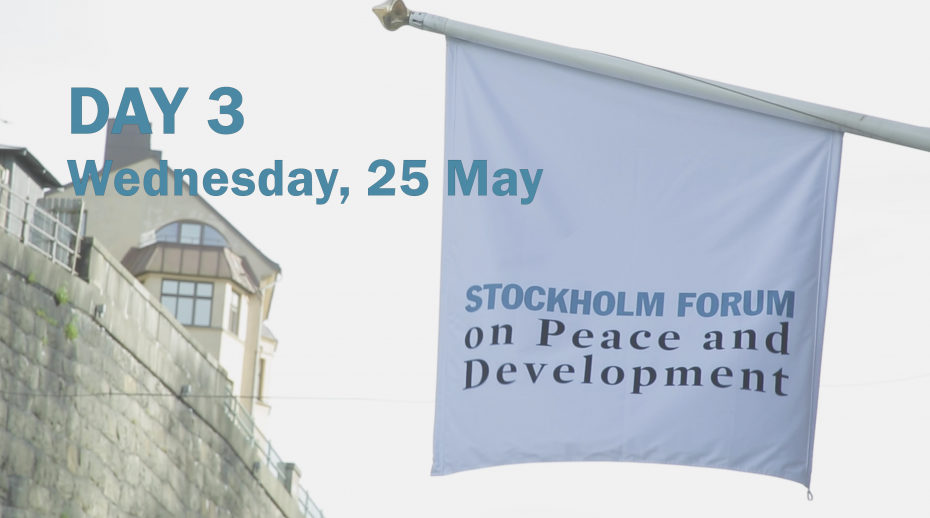NATO As Driver Of Climate Crisis And War
Posted in Abrüstung, Conversion, Europa, Friedensbewegung, Friedensforschung, Friedenspädagogik, Friedensstruktur, Gewaltprävention, Global | No Comments »
Posted in Abrüstung, Conversion, Europa, Friedensbewegung, Friedensforschung, Friedenspädagogik, Friedensstruktur, Gewaltprävention, Global | No Comments »
Posted in Abrüstung, China, Conversion, Europa, Friedensforschung, Friedensjournalismus, Friedenspädagogik, Global, Indien, Krisenregion, Menschenrecht, Mitwelt, Russland, Tipp, Unfrieden, USA, Weltanschauungen | No Comments »
Closing panel: Climate security and development beyond the Stockholm Forum

The 2022 Stockholm Forum on Peace and Development (#SthlmForum) will be held on the theme ‚From a Human Security Crisis Towards an Environment of Peace‘.
The closing panel ‚Climate security and development beyond the Stockholm Forum‘, in partnership with Stockholm International Peace Research Institute (SIPRI) and the Swedish Ministry for Foreign Affairs, was streamed from 17:00–18:30 CEST.
Moderator: Dan Smith, Director of SIPRI
Speakers:
Posted in Abrüstung, Afrika, Conversion, Entwicklung, Europa, Friedensarbeit, Friedensbewegung, Friedensforschung, Friedenspädagogik, Friedenspolitik, Friedensstifter, Friedensstifterin, Friedensstruktur, Gewaltprävention, Global, Menschenrecht, Mitwelt, Peacebuilding | No Comments »
Tamara Lorincz ist eine bekannte Friedens- und Klimaaktivistin von IKFF/WILPF Kanada, die viele Vorträge auf internationalen Webinaren gehalten hat. Nach ihrer Teilnahme an der COP 27 in Ägypten reiste sie direkt nach Russland, wo sie sich mit Friedensaktivisten und Studenten traf. Es folgten Reisen nach Rumänien, Polen, Lettland und Finnland.
Viele interessante und wichtige Informationen. Sehr zu empfehlen!
Quelle: WILPF Norway On · Add Comment
Posted in Abrüstung, english, Friedensbewegung, Friedensforschung, Friedenspädagogik, Friedensstifterin, Gewaltprävention, Global, Mitwelt, Umwelt, Unfrieden, Zivilcourage | No Comments »
Tomorrow TFF’s „Transnational Peace Affairs“ will present it’s new online magazine Bootprint. It sources to the (huge) role the world’s military systems play in climate change.
lesen sie mehr »Posted in Abrüstung, Afrika, Amerika, Asien, China, Conversion, Deutschland, english, Entwicklung, Europa, Friedensarbeit, Friedensbewegung, Friedensforschung, Friedenspädagogik, Friedenspolitik, Gewaltprävention, Global, Indien, Italien, Kriminalität, Krisenregion, Menschenrecht, Mitwelt, Nahost, Österreich, Russland, Rüstungsexport, Schweiz, Slovenien, Slowakei, Südamerika, Südosteuropa, Tipp, Tschechien, Umwelt, Unfrieden, Ungarn, USA, Völkerrecht, Waffenhandel, Weltanschauungen, Wirtschaft | No Comments »
A new SIPRI Searchlight film takes an in depth look at what key stakeholders think about the idea of an institutional home for climate change at the United Nations.
Overall – the film finds – stakeholders do not want to create parallel institutions at the UN, but they are supportive of a coordinating mechanism which will: facilitate speedy analysis of climate related security risks; support better coordination of different actors within and connected to the UN system. And, ultimately, a UN security council which is fit to deal with the complex, overlapping security risks of our time.
Posted in Friedensarbeit, Friedensforschung, Friedenspädagogik, Friedensstruktur, Gewaltprävention, Global, Mitwelt | No Comments »
 The first Climate Change Awards were presented during plenary sessions on July 7–9, 2014, at the Ninth International Conference on Climate Change in Las Vegas, Nevada. The event was attended by 650 scientists and others interested in climate change. The following awards were presented: lesen sie mehr »
The first Climate Change Awards were presented during plenary sessions on July 7–9, 2014, at the Ninth International Conference on Climate Change in Las Vegas, Nevada. The event was attended by 650 scientists and others interested in climate change. The following awards were presented: lesen sie mehr »
Posted in Abrüstung, english, Friedensforschung, Friedenspädagogik, Weltanschauungen, Wirtschaft, Zivilcourage | No Comments »
 A study published in the journal Nature predicted climate destabilization will hit the tropics by 2020 and the rest of the world by 2047. This could lead to widespread global famine and conflict in the next few decades. The displaced will go to the rich countries.
A study published in the journal Nature predicted climate destabilization will hit the tropics by 2020 and the rest of the world by 2047. This could lead to widespread global famine and conflict in the next few decades. The displaced will go to the rich countries.
Posted in Uncategorized | No Comments »
 www.climate-literacy.eu
www.climate-literacy.eu
DE – FR – NL – ESP …
By now, we all know the inconvenient truth about climate change:
it’s here, and its impact is huge.
But many of us know there is little use in dwelling on the past, or even the present. It’s tomorrow that should interest us.
A tomorrow with sustainable communities, which will not make the same mistake twice.
It’s up to all of us to build that new sustainable society. So it’s mandatory that we start by
Posted in Conversion, english, Europa, Friedenspädagogik, Gewaltprävention, Global, Krisenregion, Menschenrecht, Österreich, Tipp, Unfrieden, Weltanschauungen, Wirtschaft | No Comments »

UN Secretary General Ban Ki-moon
Posted in Abrüstung, Deutschland, Friedensbewegung, Friedenspädagogik, Friedenspolitik, Friedensstifter, Friedensstifterin, Friedensstruktur, Gewaltprävention, Global, Menschenrecht, Termine, Tipp, Umwelt, Unfrieden | No Comments »